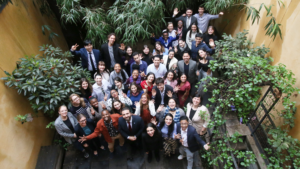 What does solidarity actually mean and how can we experience it? Today, the word solidarity is often used in political debates independent of political camps or ideologies, and its precise definition can become obscured. Six WYA members from the Austrian National Chapter wanted to uncover the meaning of solidarity and subsequently travelled to Poland where “Solidarity,” the most famous political movement for freedom within the Communist Eastern bloc, started in the early 1980s.
What does solidarity actually mean and how can we experience it? Today, the word solidarity is often used in political debates independent of political camps or ideologies, and its precise definition can become obscured. Six WYA members from the Austrian National Chapter wanted to uncover the meaning of solidarity and subsequently travelled to Poland where “Solidarity,” the most famous political movement for freedom within the Communist Eastern bloc, started in the early 1980s.
Our trip began in Warsaw, the capital of Poland, where the Austrian members were cordially welcomed by representatives of the Polish WYA National Chapter. In the same footsteps of John Paul II, George H. W. Bush and Margret Thatcher, we also visited the grave of Fr. Jerzy Popieluszko. Raised in a small village from the northeast of Poland, Fr. Jerzy Popieluszko was a charismatic priest who gave moral and spiritual support to strikers in the Warsaw Steelwork in 1981. Thereafter he was associated with workers and trade unionists from the Solidarity movement who opposed the Communist regime in Poland. As a staunch anti-communist, he criticised the Communist system in Poland and motivated people to protest for freedom. His speeches were regularly broadcast by Radio Free Europe and became famous throughout Poland for an uncompromising stance against the regime. He soon became a thorn in the flesh of the Communist regime at the time, the Polish Służba Bezpieczeństwa (“Security Service of the Ministry of Internal Affairs”), and the Służba Bezpieczeństwa tried to intimidate him. After a house search, Fr. Jerzy was arrested and jailed, but he was soon released on intervention by the Catholic church. After a failed assassination attempt on his life, he was offered a stay in Italy by his superior, but he refused to leave Poland. On October 19th, 1984 he was murdered by three officers of the Służba Bezpieczeństwa. After the murder, 800,000 people attended his funeral.
Hearing about the history of this man who died for the freedom of his country was the most powerful lesson on solidarity I had ever experienced. I realized from the example of Fr. Jerzy Popieluszko that solidarity is about selflessness. He spread a message of freedom and supported the families of political prisoners and people who had no money because of their politically motivated strikes from work. He did not receive any reward for his commitment: instead, he received the Communist government’s hostility towards his political activity, he was constantly watched by state agents, publicly defamed by government-controlled media, and endured the political oppression of his loved ones.
I also learned that solidarity is not about being a fearless super hero, nor is it about the ability to bear all risks against all odds. Fr. Jerzy was a simple man who came from the provinces and had a humble background. He also probably experienced a lot of fear for what he was doing. This was understandable in his situation, in a country where dissidents were treated as public enemies. Just as Fr. Jerzy exemplified, solidarity is about overcoming one’s fear and testifying to human dignity. His life’s sacrifice was not in vain; his solidarity was answered by even more standing in solidarity. 800,000 people attended his funeral to pay him homage. Even in death, Fr. Jerzy acted as a silent voice crying for freedom and human dignity.
By Alexander Zarari, a WYA member from Austria







